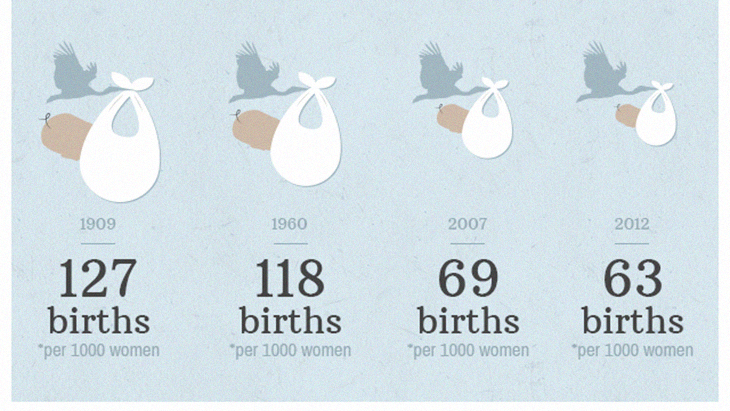
The global population is set to peak around the year 2064 at a whopping 9.7 billion people, but that number isn’t going to last forever. Studies show that by the time the 21st century is almost over, the numbers will be as low as 8.8 billion. It might sound like a huge number, but the possible negative impact on the planet is quite worrisome.
In an interview with BBC News, Professor Christopher Murray said, “That’s a pretty big thing; most of the world is transitioning into natural population decline. I think it’s incredibly hard to think this through and recognize how big a thing this is.”
“It’s extraordinary, we’ll have to reorganize societies,” he added.
Although most people have talked about how the growing population is doing the planet more harm than good, research has shown that the lower numbers will eventually cause ‘profound social changes’ in a number of countries all around the world. In fact, if governments don’t issue some new policies when it comes to reproductive health, their economies are going to suffer in the long run.
Researchers from the University of Washington Institute for Health Metrics conducted a new study which was published in the peer-reviewed medical journal The Lancet. It showed that fertility rates are dropping, and expected to continue to fall at quicker rates as the years pass.
Unlike the 1950s, where women were recorded giving birth to an average of at least 4.7 children, by 2017, the birth rate has decreased by almost half at 2.4. But the new research suggests that by 2100, that number will collapse even further to a staggering 1.7.
Professor Murray exclaimed about these projections, “That is jaw-dropping.”

These studies have also shown that there are 23 countries, including Spain, Portugal, Japan and Thailand, that may possibly find their populations decrease by more than half by century’s end.
Meanwhile in China, which is well-known to have the highest number in population all across the globe, is expected to grow to at least 1.4 billion people in the next four years. But research also shows that this number will reduce to 732 million by 2100. When this happens, India will take its place as ‘the most populous nation.’
And perhaps the decline in Japan’s numbers is one of the most alarming of all. While the country’s population peaked in 2017 at 128 million people, it’s expected to fall to a troubling 53 million by the end of the century as well. That’s over half of the current population today. Italy follows closely afterwards, thought to fall massively from 61 to 28 million.
Many might be wondering why these studies are so worrisome, especially because smaller populations tend to be better for the environment. But it’s the other issues that people don’t think about when it comes to a lowered population rate. According to Murray, “That would be true expect for the inverted age structure 9more old people than young people) and all the uniformly negative consequences of an inverted age structure.”
“It will create enormous social change. It makes me worried because I have an eight-year-old daughter and I wonder what the world will be like,” he also said.
Smaller populations mean that governments will have higher healthcare costs but less people to care for the elderly. It will also create more pressure for the elderly to work longer and retire later on when they should already be enjoying their lives. Poorer countries whose governments are strapped for cash will also have a ‘shrinking tax revenue base,’ making it harder to fund the country’s needs like infrastructure, education and better retirement packages for their citizens.
Japan is the perfect example of a nation that has ‘struggled to remain competitive’ since their population lacks people in the workforce and has more senior citizens that need caring for. Because of this, their government has had no choice but to raise the retirement age from 60 to a worrisome 65 to 71.
Many wonder why there has been such a large decline in fertility and population growth, but studies show that one main reason is because women not only know so much more when it comes to reproductive health, but because they also have easy access to contraceptives.

Another Professor, Stein Emil Vollset, explained “Responding to population decline is likely to become an overriding policy concern in many nations, but must not compromise efforts to enhance women’s reproductive health or progress on women’s rights.”
Because of this, researchers suggest that countries dealing with population declines should come up with new policies to not only help improve reproductive health, but to also find ways to boost fertility rates. Professor Murray iterated, “We need a soft landing.”
Some countries have chosen to deal with their dropping population by allowing people to legally immigrate to their shores. But Professor Murray shared, “We will go from the period where it’s a choice to open borders, or not, to frank competition for migrants, as there won’t be enough.”
But if numbers continue to drop, then finding people to migrate might not even be an option. Professor Ibrahim of the Abubakar of University College London (UCL) went on to say, “If these predictions are even half accurate, migration will become a necessity for all nations and not an option. To be successful we need a fundamental rethink of global politics.”
“The distribution of working-age populations will be crucial to whether humanity prospers or withers,” he also shared.
People shouldn’t conclude that a lower population also means that those that are on the planet will have ‘more material prosperity.’ Professor Murray warns, “I find people laugh it off; they can’t imagine it could be true, they think women will just decide to have more kids.”
He added, “If you can’t [find a solution] then eventually the species disappears, but that’s a few centuries away.”
What are your thoughts? Please comment below and share this news!
True Activist / Report a typo


